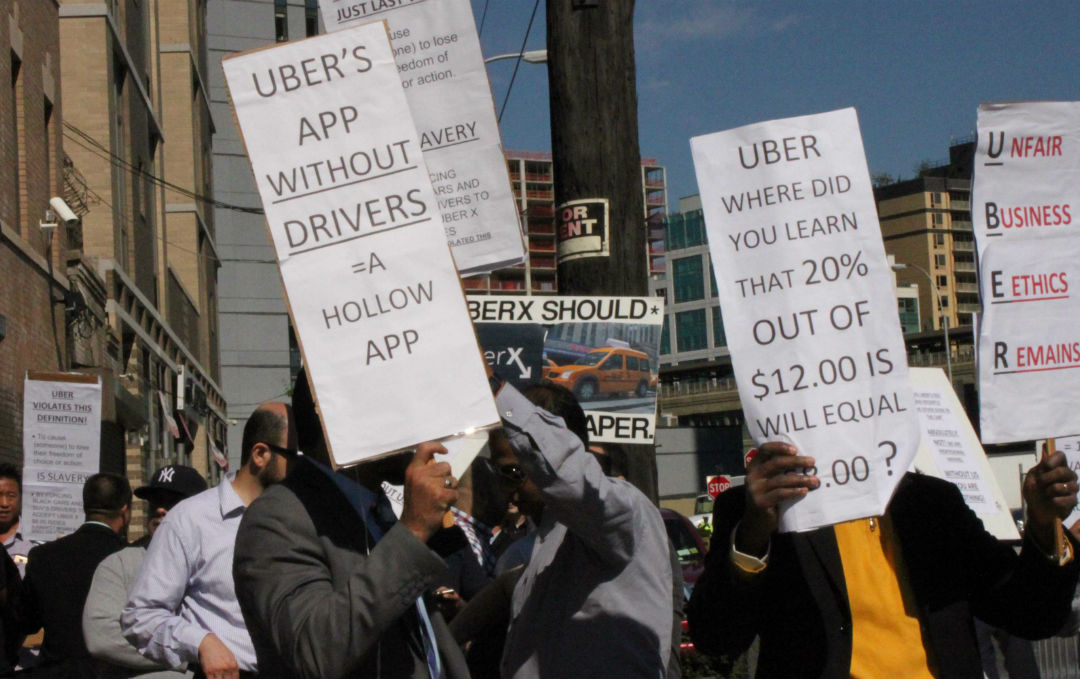Toronto Cabbies: “UberX is Illegal and Taking Food Off Our Plates!”
Cabbies are lining the downtown streets of Toronto, Canada and it looks like there’s even potential for violence, after 500 angry drivers blocked traffic going into city hall this past Monday.
Check out this angry cabbie who was spotted kicking a car suspected to be a private cab!

Just a few of the 500 plus demonstrators who blocked city streets a few days ago:

Now the City of Toronto is taking the issue to the Superior Court of Justice, seeking a permanent ban on the ride sharing service, an app which has already been banned from all city-issued mobile devices — ie., if you work for the city, you can’t use Uber or UberX unless you have a personal phone of your own.
Kristine Hubbard, operations manager for Beck Taxi, one of Toronto’s largest taxicab companies:
“A company came into a regulated market and decided the rules don’t apply to them. In any other industry, this would not be happening. No restaurant could open without food inspections or a liquor license.”
Though many of us who enjoy using the service might be hesitant to lend our sympathy to the more expensive cab companies around the world, they are making a pretty good argument for banning UberX: a new offshoot of the popular app that started by bringing licensed cab and limo services together with people looking for a better deal on their transportation.
Hubbard and city lawyer Michele Wright, who petitioned Superior Court of Justice Sean Dunphy for an injunction on the service recently, may just have a point about the safety concerns.
I found this little transcript from the hearing to be quite amusing:
Dunphy also questioned whether Uber could be considered a taxi brokerage – noting a maitre d’ in a restaurant might find a taxi for a customer, but does that make him a taxi brokerage.
Similarly, he said Bell — the telecom giant — which facilitates the hailing of cabs either by phone or smartphone app, is also linking drivers with passengers, so would it be considered a taxi brokerage, too?
Wright replied that the restaurant staffer is not being paid to hail the cab, unlike Uber, who receives remuneration for its work.
Seriously? I don’t see the link myself. The maitre d’ is simply providing good service to their customers, just as a hotel staffer or bartender would, to ensure a happy and repeat customer who’ll tell their friends about their good treatment.

Cabs need to be licenced by the city and are subject to routine safety compliance to protect passengers and the drivers. Private drivers from Uber are not, since you only need to have a safety inspection done on your car once, when buying the vehicle. Other than a bi-yearly emissions inspection, you can drive your car until the wheels fall off in the province of Ontario (or the cops pull you off the road for driving an unfit vehicle).
Still, the cabbies want the service gone — not because it’s unsafe — but because it’s competition. Uber claims that most of the 1,500 registered drivers in the province are located in or around the city.
Oddly enough, it’s out-dated regulations that allow the service to be perfectly legal:
Because Uber, the company, doesn’t accept calls, it doesn’t trigger the licensing scheme, she said. “The provision of the municipal code has not kept up with new technology,” she said. “It is not for the court to amend the municipal code. It’s for the legislators.”
Then there’s the issue of passenger/driver safety due to issues like sexual assault and violence. For instance, a woman in the Vaughn region of Toronto was sexually assaulted by an Uber driver in 2014.
By all rights, UberX should be either banned for the safety concerns, or regulated; requiring UberX drivers to be subject to routine safety inspections, appropriate insurance coverage and any other requirements that the city requires in order to be licensed to drive a cab legally.
Several states, California being one, are taking a more civil approach to ensuring the safety of people using the service. New laws have already been signed allowing UberX drivers to operate within the state, provided they meet the safety and insurance guidelines set out in the new regulations (see more).
Share your thoughts. Ban or no ban?
Main image by Business Insider

